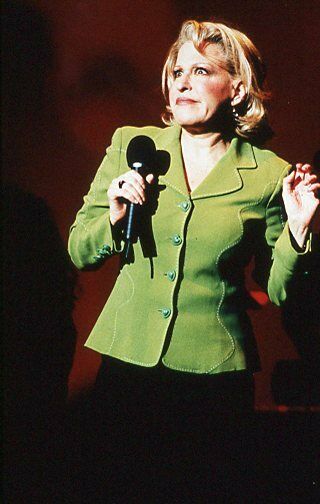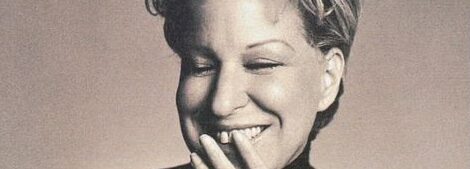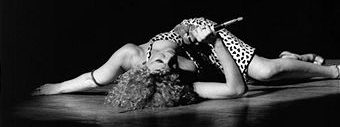The Cut
25 Famous Women on Their Mentors
By Julie Ma and Brooke LaMantia
March 1, 2022




Our Idols, Their Mentors, Bette Midler
Having a mentor isn’t something you outgrow no matter your age. Whether it’s a role model for success in your industry or just someone you know who embodies the habits and values you wish to possess, the lessons we learn from watching our real-life and aspirational mentors are imperative to our self-growth. Below, 25 famous women discuss the women and men they’ve looked up to. Read on for Amandla Stenberg on Rihanna, Laverne Cox on Tracey “Africa” Norman, Beanie Feldstein on Barbra Streisand, and more.
Laverne Cox
“[Tracey Africa] was a black trans woman who modeled in the ’70s, and had cosmetics deals and a hair contract with Clairol — it was a big deal. People think, ‘Oh, this trans revolution is just starting,’ but we’ve been around for a very long time. It’s important to know that there’s been a path blazed for me.” —Cosmopolitan, September 2016
Olivia Rodrigo
“I’ve always looked up to Taylor [Swift] since I was literally five years old. Obviously I think she’s the best songwriter of all time, but she’s so business-savvy and she really cares about her career in that regard too — that’s been really inspiring for me to watch somebody take control of their career and their life like that.” —NME, May 2021
Viola Davis
“Meryl [Streep] does it all the time. She [gives lessons in confidence] all the time. I think she does it in a way that she doesn’t even understand or think she’s doing it. You know, she just sent me an email, and I was like, ‘That’s perfect.’ She was like, ‘Yes, Viola, now that you’ve just had your vow renewal … this is the best part of your life now. There’s not anything that you don’t know anymore in terms of what’s good and bad out there, so now you can just fly.’ She’s always imparting wisdom like that.” —Elle, February 2016
Alexandria Ocasio-Cortez
“The mentorship of elders is what got me here. In Latinx + Indigenous communities, an elder is an honorific that doesn’t come with age — it comes w/ univ acknowledgment of wisdom.” —Twitter, December 2018
Mindy Kaling
“As an overall person? I would say that my mother is the single biggest role model in my life, but that term doesn’t seem to encompass enough when I use it about her. She was the love of my life.” —Rookie: Yearbook Two, October 2014
Sydney Sweeney
“When I was younger, I had this mentor who told me never to use personal memories or triggers to get myself in a place for a character because you can blur the lines. So I took that advice. It has helped me be able to just jump in and out of literally crying and screaming to then laughing two seconds later. I must look psychotic but it helps me to be able to go home, switch off and be OK.” —tmrw, May 2021
Janelle Monáe
“I see so much of my mom in Teresa [in Moonlight]. It’s not even funny. When I think about just the strong African woman who was there for me and all of my cousins pretty much, she was always there to listen to us and not judge us. My mom actually had to sacrifice her senior year in high school to give birth to me — that’s a sacrifice. So I owe my mom so much, and she never tried to force me to become or be someone that I never spoke about being. She always encouraged me to follow my heart, and she knew how much I loved to entertain. My mom actually has wanted me to be in movies before my singing. She doesn’t think I’ve made it until I’ve been in a movie.” —the Frame, October 2016
Amandla Stenberg
“I had the chance to go to the Black Girls Rock awards the other night in New York and Rihanna was getting this award for a rock star. And basically, Black Girls Rock is all about being role models for black girls. And when she got on stage she was like, ‘I really appreciate this award because I don’t normally get awards for being a role model.’ And I was thinking about that and then I had the chance to talk to her afterward. And I was like, ‘You really are a role model and you probably don’t realize it. You’re a huge role model to teenage girls who experience all kinds of crap for enjoying their sexuality, for being themselves, for getting what they want, for not letting the perceptions of men get in the way of what they want to do.’ And I told her that she was a role model in that way and that she’s been a role model to me oftentimes when I’ve been navigating high school, letting boys dictate what I wear or how I present myself or what I decide to do and being afraid that they will judge me. But then a Rihanna song comes on and I don’t care about that anymore. And so I realized that basically, the best way for me to be a role model is to be as true to myself as possible. And that doesn’t mean I have to achieve some kind of image or be this icon or mold myself into a role model. It just means I have to keep doing my thing. Oftentimes your authenticity is your activism and being as true to yourself as possible is the first step toward revolution.” —W magazine, July 2016
Janet Mock
“I’ve preached the importance of having role models, mentors, and friends who support you. It took a village for me to be who I am today, and it still takes a village to assist me in the journey ahead. While the struggles were mine alone to grapple with, I am a product of my support system, a community that included straight parents and siblings, gay and lesbian classmates, gender-nonconforming teen support group members, drag queens who practiced at the community recreation center where I hung out as a kid, queer volleyball teammates, and older trans women who used their transition experiences to light my path.” —her site, June 2011
Beanie Feldstein
“Two words got me into acting: Barbra. Streisand.” —The Hollywood Reporter, May 2019
Margaret Cho
“In my own life, there is [the loss of] Robin Williams and Joan Rivers and so I guess it’s also about the passage — about becoming a mentor after your own mentors die. You have to become that. So I think that’s what I’m trying to do.” —AlterNet, September 2015
Sheryl Sandberg
“My grandmother [is a role model]. She grew up poor and her parents divorced, which was unheard of during that time. She ended up graduating from Berkeley and was the first generation to go to college. She was diagnosed with breast cancer in her 30s and started raising money for breast-cancer screenings for other women. She literally drove around selling watches out of her car to raise money. When my grandfather’s business was about to go under, she took over the business and saved it. My mom was another strong mentor, role model, and inspiration. Arianna [Huffington] has been a tremendous source of strength and support to me.” —Lenny, June 2016
Tina Fey
“I have been thinking over the last month, how can we proceed with dignity in these increasingly ugly times. And it occurred to me that Sherry [Lansing] is the perfect role model. Talk about someone who remained graceful and effective in what must have been an incredibly misogynistic environment. She’s too refined to ever say, but you know Sherry Lansing has witnessed some nonsense and encountered some behavior. Things that the young people today would call ‘triggering.’ And yet she was able to flourish and lead, with all her humanity and femaleness intact. Maybe we can all make that our mantra over the next four years. ‘What Would Sherry Lansing Do?’” —The Hollywood Reporter’s 2016 Women in Entertainment breakfast, December 2016
Kimiko Glenn
“I think there’s a lack of openness in casting an Asian character in a leading role, or unless they’re a stereotype. It’s been hard. … And growing up, there weren’t too many role models to look up to on television. There was Lucy Liu and Sandra Oh. But I think that’s so important because if you see people in entertainment and in media, you relate it to yourself, so I would never think I could be able to tell my story.” —the Daily Beast, June 2014
Tommy Dorfman
“I think trans generations are a little different because it’s about when you start transitioning. Whoever your contemporaries are — whether it’s someone in their 50s, someone in their 20s, someone in their teens — those are the people born in your year, in a way. Some trans elders are younger than me because they’ve been living in a trans body for 10 to 15 years. It’s sort of like how someone had to teach you the ropes of working in fashion, or how in most traditional family structures, cis mothers teach cis daughters how to be women in this world. It’s very much a mother-daughter type of relationship. There are a lot of incredible trans people on the Internet, and it’s even powerful to see them without being in the same space. Whether that’s Mj Rodriguez or Charlene Incarnate or someone I can actually call, like Jamie Clayton or Our Lady J or Hari Nef.” —InStyle, August 2021
Constance Wu
“There were so few Asians on-screen when I grew up, and the ones who were on-screen weren’t given complex characters to play. In terms of pure acting, my role model has always been Philip Seymour Hoffman; I really always loved what he did. I love what Mark Ruffalo does. When I was younger, I liked Cate Blanchett a lot. These are all actors who are given stories and allowed to carry the whole story. You get to see a human at their highest point, their lowest point, and everything in between. Asian-Americans haven’t been allowed that.” —the New York Times, September 2015
Jane Fonda
“I think the best advice a mentor could have given me was, ‘Jane, you know you can say no if the script isn’t good.’ I was just so surprised anybody ever wanted me in anything! I didn’t pay enough attention. I think the only actor who ever taught me much about life, more than acting, was Katharine Hepburn in On Golden Pond. Even though I did the movie for my dad, I produced it, who I learned from was Hepburn. I was 45 when I made that movie, and it was she who taught me to be self-conscious. I used to think that was a bad thing, but that means being conscious of the self you project to the public; having a persona, a style, a presence. I had none of that. I didn’t know how to dress! When I went on stage for my father at the Oscars, because he was too sick, I couldn’t believe how I looked and how I was dressed. I never paid attention. Hepburn taught me to pay attention and that style is important.” —The Hollywood Reporter, December 2011
Sloane Crosley
“I had professors that were really amazing but in terms of actual writers, because I worked in publishing so early, there were writers that were especially kind and helpful from the get-go. Jonathan Lethem is one of them, and Lorrie Moore is another. David Rakoff was huge — I miss him dearly every day. But I wasn’t sending these people writing — they were just incredibly encouraging. In terms of influences for non-fiction, David Rakoff, Joan Didion, Joseph Mitchell, Ian Fraser. For fiction, if I woke up tomorrow and wrote like Zadie Smith I wouldn’t be mad about it.” —Big Issue North, November 2015
Abbi Jacobson
“Throughout the whole writing period Amy [Poehler]’s on all the notes calls, she directed the finale episode of the show, and she’s also in it. She just gives feedback on all the stuff, and she has a broader view of the series, and our careers. She’s a great role model in this industry. … She’s like this mogul. She’s sort of calm and just like a boss bitch.” —Channel Guide Mag, January 2014
Sophia Bush
“It can be so easy to operate like an island, and never ask for help. I find that I am finally comfortable reaching out more. Eva Longoria. Connie Britton. Debra Messing. Those ladies are always there for me. More recently I’ve been spending time with Ava DuVernay and Sarah Lewis — she is a beyond brilliant Harvard professor and fellow Super Soul 100 change-maker — and they both just blow my mind.” —Makers, August 2016
Justice Sonia Sotomayor
“Until I met José Cabranes, I could not have imagined him … When a young person, even a gifted one, grows up without proximate living examples of what she may aspire to become — whether lawyer, scientist, artist, or leader in any realm — her goal remains abstract. Such models as appear in books or on the news, however inspiring or revered, are ultimately too remote to be real, let alone influential. But a role model in the flesh provides more than an inspiration; his or her very existence is confirmation of possibilities one may have every reason to doubt, saying, ‘Yes, someone like me can do this.’ By the time I got to Yale, I had met a few successful lawyers, usually in their role as professors. José, the first I had the chance to observe up close, not only transcended the academic role but also managed to uphold his identity as a Puerto Rican, serving vigorously in both worlds … José has often spoken of what an unusual protegee I’ve been, how I often confer with him, only then to do exactly as I please. He’s only half-joking.” —My Beloved World, January 2013
Bette Midler
“One of my first role models was Eugene Lang, a wealthy businessman who went back to his elementary school in East Harlem and addressed the sixth-grade class. He looked out at that sea of faces and said, ‘If any of you wants to go to college, I will pay for it.’ When I read that, I burst into tears. It was so generous and so basic. Not fluffy. I can’t understand why we scrimp on education and shortchange our kids. Why would the citizenry do that to the people who are going to inherit its republic?” ––O, the Oprah Magazine, January 2001
Tina Turner
“My role model was always Jacqueline Kennedy Onassis. … My taste was high. So when it came to role models, I looked at presidents’ wives. Of course, you’re talking about a farm girl who stood in the fields, dreaming, years ago, wishing she was that kind of person. But if I had been that kind of person, do you think I could sing with the emotions I do? You sing with those emotions because you’ve had pain in your heart. The bloodline of my family didn’t come from that kind of royalty. Why I relate to it, I don’t know. That’s the class I wanted to be. But I wasn’t, so I dealt with the class I was in. I have never disrespected myself, and I’m still very proud of myself.” —Rolling Stone, October 1986
Michelle Obama
“Every event I go to, every rope line, women are looking better with every passing year. I run into women all the time who will just happen to mention, ‘Oh, I’m going to be 60,’ and it’s like, ‘You’re kidding me!’ I just went to see Cicely Tyson on Broadway. She is in her 80s and did a two-hour play with stamina and passion. I told her, ‘I want to be you when I grow up!’ [And] there’s Jane Fonda, a beautiful, engaged, politically savvy, sharp woman.” —People, January 2014
Salma Hayek
“People often ask me if I have a role model — another actress I admire, or someone in my life I aspire to be like. For years I wasn’t sure how to answer. But when the question came up again recently, I finally realized that I’ve always been most moved by the women in my family who never became what they could have, who was magnificent in so many ways but who didn’t get to live to their full potential. My grandmother was energetic and fearless — a talented poet and songwriter. She was also interested in chemistry and history and medicine, taking care of the people in her hacienda in Mexico, delivering babies. She could have become anything, but this was the 1930s, and she was forced into an arranged marriage … My mother, too, had to put aside her dreams. She wanted to be a singer, but that was looked down upon in the society she grew up in. She told herself she wasn’t good enough, and married and had children instead of studying music … When I started acting, I was told over and over again, ‘You’re no good.’ But I said to myself, You’ve got to keep it up. I see now that the experiences of my mother and grandmother inspired me profoundly. Thinking about them impacts every aspect of my life — including how I raise my daughter, Valentina.” —O, the Oprah Magazine,






